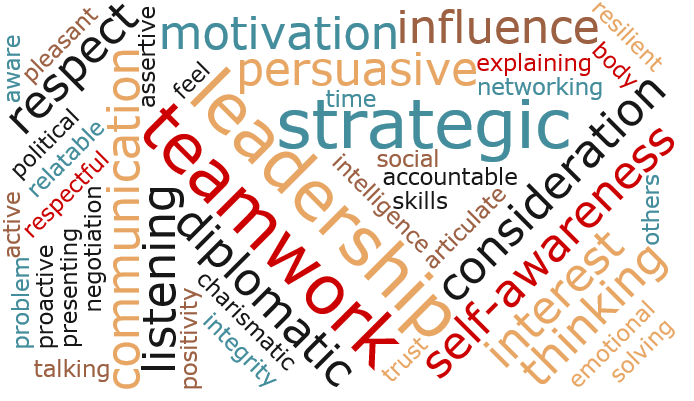What drives a person’s success?

What skills do the people ahead of you on the career ladder have? How do you upskill and get promoted?
Often it’s not that they know more than you, or they can do more than you. They are likely to have developed better People skills.
What do People skills give you? How can you practice them?
The early years of our career
Most of us start our career by choosing a function/area in which to develop our knowledge and skills, for example, HR, Operations, Finance, Sales, Marketing.
We then spend several years learning about the technical aspects of our chosen area. We may study to get qualifications demonstrating what we know. We gain experience through working with others. We can apply our knowledge in a number of different situations.
Yet increasing our knowledge and experience, while important for doing our jobs, does not automatically lead to progression up the career ladder.
Putting ideas into practice
Companies value and promote those people who are able to deliver results. If a business can’t turn ideas into reality, then it is not likely to succeed or even survive. It is a harsh, but true, fact of business life, and the reason why People Who Can Deliver are so valuable.
To be seen as a Person Who Can Deliver, you need to be able to
- Identify the right ideas
- Turn those ideas into activities and projects that deliver something better
- Deliver that something better
A fair number of people are good at 1 & 2. Fewer are able to do 3 and actually execute their plans; fewer still can do 1, 2 and 3 successfully and smoothly. Becoming part of the elite few who can harness their knowledge and experience to deliver well will clear the path to promotion.
Delivering through others
In a company of any size, you will be working with other people who all have different roles, responsibilities, tasks and personalities. When you are working with other people, good personal relationships make the tasks easier.
When you are responsible for delivering a project THROUGH other people – coordinating teams, departments, suppliers, customers – having excellent people skills becomes more than just important for getting the job done; they are essential to success. And the more senior you become, the more you need these skills.
Building people skills
We start building our people skills from a very young age as babies. There is a huge amount to learn and much of this we learn without consciously thinking about it. Some of the skills that might be associated under “people skills”
We practice our people skills in nearly all occasions in which we interact with other people, in work, with friends and with strangers. The range of skills is endless; conscious & unconscious, physical, like body language and smiles, verbal, tonal, whether we celebrate success and remember birthdays or offer a cup of tea.
Our people skills have a very direct impact on our career progression. The better our people skills, the more effective we are likely to be at delivering results: those who are doing the doing respond better to what we ask for; we listen to good suggestions and take them on board; we treat our teams well and they work harder. This makes us more likely to be promoted into roles that use these people skills even more. These positions are often management positions.
“Management” is about managing people, not technical knowledge
We are promoted into management when we have demonstrated a certain level of people skills on top of our knowledge and technical skills. As managers we are asked to:
- help others develop their skills within the company
- ensure that the team is co-ordinated and striving towards the same goals
- recruit new joiners to ensure we have the right skills to deliver what’s needed
- manage team workload and team performance
- support and fight for the team as needed
- keep staff turnover low – which reduces training time & knowledge loss as well as reduces the cash cost of recruitment and training
The better we are as a manager, the more likely our team is to perform. The above list requires a wide range of people skills.
Whilst it would be great to say management only ever spreads joy and happiness throughout their teams, in reality managers also have to deliver tough messages and deal with many personnel problems. But how many companies offer specific management training when you make your first step into management, and help you prepare for the tough situations? In our experience, not enough.
What exactly are companies paying top management for?
Businesses want individuals that have very good people skills for their leadership teams. This is simply because business leaders spend most of their time dealing with people. For the top leaders, 85% of their role is leading and managing people.
The company benefits from having good managers and senior management teams. They lead to significantly better performance, happy staff, lower turnover, a more attractive place to work for staff and a better brand. It really is in the company’s interests to ensure their managers are well trained and effective. There’s a well known saying that ‘staff do not leave a job, they leave a manager’. High attrition rates are a warning sign worth heeding.
Making the leap up to Management level
Developing your People skills is like developing any other skill: it requires practice.
A lot can be learnt in theory, by reading books, attending courses and other knowledge transfer approaches. We recommend that you do spend time understanding the theory of leadership, management, negotiation, influencing, presenting and the range of other important business leadership skills. This provides you will a good starting point, and an overview of different approaches will help you identify the style that feels most natural to you.
But knowledge alone will only help up to a point. You absolutely need to practice the knowledge you have acquired. Unfortunately, there is no silver bullet.
Being genuine to who you are is essential. You have to allow your values and ideals shine through. Humans are very good at detecting insincerity, and no matter how skilled a politician you are, your true value will show through the actions you take. Happily, there is no character definition that a good manager must conform to. You can be an extrovert or introvert; charismatic and outgoing or reserved and thoughtful; no one is precluded by nature.
A number of us are fortunate to have had an excellent manager who goes out of their way to mentor, coach and help us as we go through the process ourselves of learning how to manage and then lead. Some businesses have excellent support programmes in place to help managers and leaders, through leadership courses and coaching.
For those not fortunate enough to have internal coaching and support within the business, looking externally is your next option. There are many courses, programmes and coaching options to explore and your company may still support you with funding if you ask.
For middle management, courses can be a sensible option if combined with mentoring support from an experienced support manager. Remember, courses and similar programmes transfer knowledge. They do not support you directly with skill building, or give you opportunities to practice. Coaching is a longer term option, and is more focused on helping you build skills.
For senior managers, personal coaching is a cost effective way to support the transition up from management into the Company Leadership Team. The stronger the leadership team, the higher the company performance achieved. Coaching offers personalised and confidential programmes to fit individual requirements and allows you to learn though behaviours and actions; and your coach will hold you to account in your next session. Many businesses are willing to pay for external coaching if they do not have the ability to provide from internal resources, as the improvement in personal skills and performance of the managers is multiplied exponentially across the business’ performance as a whole.

Call us to start your personalised people skills development programme. Visit www.enhance.coach or call 0203 500 6300.

